Living off-grid in a vehicle offers freedom, flexibility, and a mobile path to self-sufficiency. For many, the attraction of life on the road is its simplicity and the chance to wake up each day in a new location, fully immersed in nature. However, choosing the right vehicle is crucial – it’s not just your mode of transport; it’s your home. Finding the perfect, mechanically-sound, off-grid vehicle that suits your lifestyle can make the difference between a dream journey and a logistical nightmare.
Discover the essential steps involved in finding your perfect off-grid vehicle. From understanding your needs and exploring vehicle types to conducting mechanical checks and considering essential features for off-grid living, gain practical tips and valuable insights. With thoughtful planning and the right resources, you can start your journey confidently, knowing your home on wheels is the perfect fit for your off-grid lifestyle.
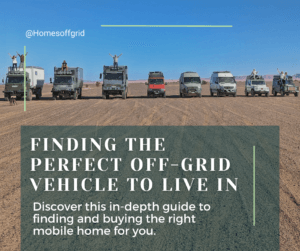
Understanding Your Needs
Before beginning the process of finding an off-grid vehicle, take time to assess your specific requirements. Every decision, from vehicle size to layout and features, will depend on how you plan to use it.
Start by considering your lifestyle. Will you travel full-time, or will it primarily serve as a mobile home which you park on a spot of land for long periods? For full-time travelling, you may need more storage, robust systems for heating and insulation, and reliable power solutions. Seasonal use or parking in one place for extended periods might require fewer amenities if you can use pre-existing infrastructure where you’re parked.
Family size and space requirements are key factors. A solo traveller might find a compact van or pickup and roof-tent sufficient. Meanwhile, a family will need a larger vehicle, like a box van, lorry or converted bus, to ensure enough sleeping and living space.
The type of travel you envision also plays a role. For off-roading adventures, a 4×4 vehicle may be essential. If you’re sticking to main roads and campsites, a less rugged option could work just as well. Additionally, think about the climate you’ll be in and how much time you’ll spend indoors. If bad weather is likely to keep you inside for extended periods, a more spacious layout can make a big difference to your comfort. Colder weather will also require insulated water systems and reliable heating. If you plan on chasing the sun and spending most of your time outdoors, you will have different priorities.
Finally, set a realistic budget. Factor in the cost of the vehicle itself, along with conversion or renovation expenses if needed. Being clear about your financial limits will help you focus on vehicles that align with your goals without unnecessary stress or compromise.
Vehicle Types and Suitability
Choosing the right type of vehicle is one of the most important steps in finding your perfect off-grid home. There are so many option, each offering unique advantages and challenges, depending on your lifestyle and goals.
Vans are one of the most popular choices for off-grid living, available in a range of sizes. Small to midsize vans are easy to drive and park, making them ideal for solo travellers or couples. They’re more fuel-efficient and cheaper to maintain than larger options, but their compact size can limit storage and living space. Large vans, such as long-wheelbase and high-roof models, provide more living space and improved storage. However, they may be harder to manoeuvre and come with higher running costs.
Lorries offer the ultimate in space and durability, with box trucks or specially built habitation boxes providing plenty of room for families or those seeking all the comforts of a traditional home. They’re highly customisable, with room for separate bedrooms, bathrooms, and even workspaces. However, lorries can require a higher budget for purchase, maintenance, and fuel. They may also need specialised driving licences and can be challenging to park and drive in urban or narrow spaces.
Buses provide similar benefits to lorries, offering ample living space and a robust frame for heavy conversions. Older buses are often more affordable, but they require thorough mechanical checks to ensure reliability. Maintenance can be expensive, and their large size makes them best suited for stationary living or carefully planned travel routes.
Pickups and SUVs with roof tents or lightweight camper-boxes are great for off-roading and adventure seekers. Their rugged design allows them to tackle remote and uneven terrains with ease, making them perfect for exploring hard-to-reach places. The trade-off is their limited living and storage space, which can be a challenge for longer trips or full-time living.
4×4 versions of any of these vehicle types are ideal for those venturing off the beaten track. They offer enhanced traction and stability, making them suitable for mountainous regions, deserts, or remote wilderness areas. However, these vehicles typically come with higher purchase, fuel and maintenance costs.
Each type of vehicle has its strengths and drawbacks. You should carefully assess your priorities. Decide what’s most important – whether it’s manoeuvrability, space, durability, or off-road capability – and match them with the vehicle that best suits your off-grid ambitions.
Mechanical Check
A thorough mechanical check is crucial when buying any vehicle. Since this vehicle will also be your home, reliability is essential. Overlooking key mechanical details can lead to costly repairs or unexpected breakdowns.
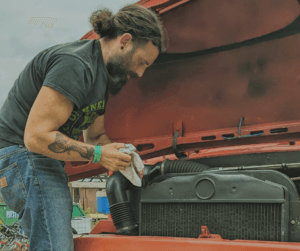
Start by reviewing the vehicle’s paperwork. Check whether it has a valid MOT (UK) or equivalent certification. Look for a service log that details previous maintenance and repairs. If the vehicle doesn’t have a formal service history, ask if the current owner has handled maintenance themselves if they are mechanically minded. If possible, research common issues specific to the vehicle model you’re considering. This can help you identify potential red flags during your inspection.
Next, perform a physical inspection of the vehicle. Examine the tyres for wear or damage and check for rust, particularly on structural components like the chassis. Look for oil leaks, signs of poor maintenance, or wear and tear in critical areas. Test the vehicle by starting it and paying attention to how the engine runs – listen for unusual noises, assess whether it starts smoothly, and ensure there are no dashboard warning lights. If possible, take it for a test drive to check its performance, including steering, brakes, and gear changes.
If you’re not confident in your ability to assess a vehicle’s mechanical condition, bring someone more experienced with you. A friend or family member who knows vehicles well can provide valuable insight. Alternatively, hire a mechanic to conduct a pre-purchase inspection. While this may involve a fee, it can save you significant money and stress in the long run by identifying hidden issues.
Taking time to check the mechanical condition of your potential off-grid vehicle ensures a smoother and safer start to your journey. After all, this isn’t just any purchase – it’s where you’re going to be living for the foreseeable future.
Essential Features for Off-Grid Living
When evaluating a vehicle for off-grid living, understanding the existing systems and ensuring they meet your needs is critical. Off-grid vehicles often feature customised setups, so taking the time to familiarise yourself with these systems is essential. Ideally, the seller should provide paperwork or operating instructions for key components, and a basic user guide for the habitation section can be invaluable for navigating the specifics of your vehicle.
Energy Systems
A reliable energy system is fundamental for off-grid living. Check whether the vehicle has solar panels, batteries, and an inverter, and evaluate their capacity and charging capabilities. Consider how much power you’ll need to run appliances, charge devices, and light your space. Look for details like the wattage of solar panels, the storage capacity of the batteries (measured in amp-hours), and whether the inverter can handle the wattage of the devices you plan to use. If the current setup doesn’t meet your needs, think about how easily it can be upgraded.
Water Storage and Plumbing
Water systems are another vital feature. Inspect the water storage capacity to ensure it’s sufficient for your lifestyle, particularly if you plan to travel to remote areas where refilling could be infrequent. Check whether the vehicle has insulated or interior tanks, which are particularly useful in colder climates to prevent freezing. Look at the plumbing setup – is there a water pump, filtration system, or hot water provision? Determine whether any additional features, such as a shower or greywater tank, align with your needs.
Heating and Insulation
Comfort in all seasons often hinges on effective heating and insulation. Evaluate the insulation quality – are the walls, floors, and ceilings adequately insulated to keep you warm in winter and cool in summer? Check that the vehicle has a reliable system, such as a diesel heater, wood burner, or propane setup. Test the system where possible to confirm it’s in good working order. If you plan to spend time in extreme climates, consider the costs of enhancing the insulation or upgrading the heating system if the current setup is lacking.
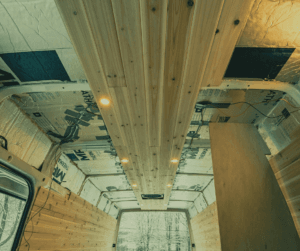
By ensuring these essential features align with your off-grid goals, you’ll create a comfortable and sustainable living environment, ready for adventures ahead. Take the time to inspect and understand these systems before purchase to avoid unexpected challenges later.
Resources for Finding The Perfect Off-Grid Vehicle
Finding the perfect off-grid vehicle requires time and research, but there are many resources available to simplify the process. Knowing where to look and how to approach your search can help you find a reliable vehicle that suits your lifestyle and budget.
Online Marketplaces, Auctions, and Specialty Dealerships
Online platforms like eBay and Facebook Marketplace are popular choices for finding second-hand vehicles. These sites allow you to browse a wide range of options, filter by location, and communicate directly with sellers. Be specific and thorough in your research, as the quality and legitimacy of listings can vary. Auctions, both online and in-person, are another potential source for bargains but often require quick decisions, so it’s vital to know your budget and vehicle requirements beforehand.
Specialty dealerships can provide more assurance when buying an off-grid vehicle. Many of these dealers specialise in campervans, motorhomes, or converted vehicles, offering quality assurance, warranties, and sometimes even customised builds.
The Listings section of this website frequently feature listings for off-grid-ready vehicles, providing a curated selection tailored to those pursuing this lifestyle.
Connecting with the Off-Grid Community
The off-grid community can be an invaluable resource for finding your vehicle. Join online forums, social media groups, or attend off-grid and van-life events to meet others who share your goals. These networks are not only great for recommendations but also for learning from the experiences of others who have been through the process. Some community members may even sell their own vehicles, which can give you access to well-maintained and thoughtfully converted options.
Be Cautious of Scammers
When searching for vehicles, be vigilant about potential scams. Warning signs include unusually low prices, a lack of detailed photos, or sellers who refuse to meet in person or allow inspections. Always verify the authenticity of a listing by checking ownership documentation and confirming the vehicle’s history through services like HPI checks or the Government website (in the UK). Trust your instincts – if a deal seems too good to be true, it often is.
By exploring these resources and staying cautious, you can confidently navigate the process of finding your ideal off-grid vehicle, ensuring it meets your needs and provides a reliable foundation for your off-grid journey.
Conversion Considerations for Self-Sufficiency
Buying a Pre-Converted Vehicle vs. Converting Yourself
One of the first decisions to make is whether to buy a pre-converted vehicle or purchase a base vehicle and convert it yourself. The choice will depend on your skill level, budget, and the desired result. Pre-converted vehicles can save time and can ensure a certain level of quality, but they may come at a higher cost. The condition of the conversion and its suitability for your needs can vary greatly depending on whether it was done professionally or by the previous owner.
If you decide to buy a pre-converted vehicle, it’s important to find out who did the conversion. Was it a professional or the seller? Was the conversion executed thoughtfully, with attention to detail, or was it a rushed job? Ideally, the conversion should align with your needs and include features like adequate insulation, efficient energy systems, and a practical layout.
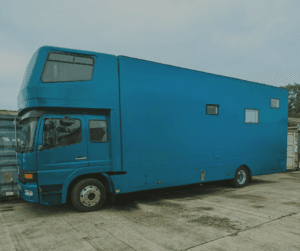
DIY vs. Professional Conversions
If you choose to buy an empty van and undertake a conversion yourself, you should consider the pros and cons. A DIY conversion allows for complete customisation, but it requires significant time, skill, and effort. You’ll need to budget for materials, tools, and potentially expert advice if you encounter technical issues. On the other hand, professional conversions offer expertise and can be a quicker, more reliable route, but they come with higher costs.
Layout Considerations
The layout of the vehicle is a crucial factor in deciding which one to purchase. It should accommodate your needs – whether that’s for sleeping, cooking, or working – and allow for comfortable living. If a vehicle has an existing layout that doesn’t quite suit your lifestyle, you may need to consider whether you can adapt it or if a full remodel is necessary. Evaluating the layout will help you decide whether a vehicle is a good fit or if further modifications are required to make it perfect for your off-grid ambitions.
It’s important to be realistic. Your chances of finding the perfect vehicle with no compromise or adjustments are fairly small, but it will be a great start to realising your off-grid dream.
Common Challenges and How to Overcome Them
Try Before You Buy
Choosing the right vehicle for off-grid living is a significant decision and getting it wrong can be costly. If you’re unsure about what you want from your vehicle, consider renting a campervan to test different setups. While this isn’t always available for niche vehicles like lorries or bus conversions, renting a larger van can help you understand your needs and preferences. This allows you to make informed decisions about customising your vehicle.
Managing Maintenance and Repairs on the Road
Once on the road, managing maintenance and repairs is crucial. Familiarising yourself with basic tasks like checking and changing fuel filters, and oil can help keep your vehicle healthy. Learning how to perform these tasks or having the tools on hand can prevent costly repairs and disruptions to your journey. Roadside recovery services can be vital in areas like France where private recovery is mandatory but expensive without pre-existing coverage. Even if you’re mechanically inclined, having assistance can make a significant difference in a breakdown. Local garages and parts shops can be helpful in remote areas, so it’s useful to ask other travellers or locals for recommendations.
Ensuring Compliance with Local Laws and Road Regulations
Compliance with local laws and road regulations is another common challenge. Beyond regular checks like MOTs, tax, and insurance, it’s important to be aware of additional requirements. For example, in some regions carrying snow chains may be mandatory or you may have to navigate emissions zones. Familiarise yourself with these rules in the areas you plan to travel to ensure you’re compliant and avoid fines. Keeping updated with local regulations will help you maintain a smooth journey and avoid unexpected costs.
Conclusion
Finding the perfect off-grid vehicle tailored to your lifestyle is the first step towards self-sufficient life on wheels. It’s essential to take the time to plan and research thoroughly. Consider all the factors that will make your living arrangement successful. Whether you choose pre-converted or a DIY conversion, a small van or a bus, each option has its own set of advantages and challenges. Take the time now to invest in a vehicle that aligns with your goals, and you’ll be well on your way to enjoying the unique lifestyle that off-grid living has to offer.
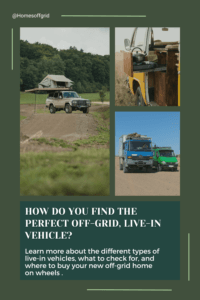
To find out more about off-grid living explore the Reading Room.


